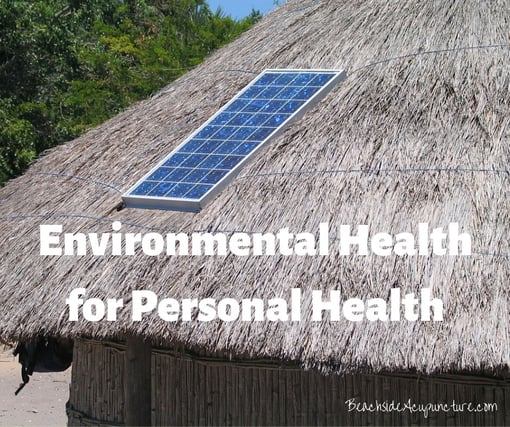
We sometimes take for granted how lucky we are to have access to fresh air, clean water, and the other things the body needs to function and don't think about how our actions can be setting us up for scarcity in the future. A lot of our health is within our personal control - i.e. you choose your activity level and the amount of sleep you get at night - but when it comes to the environment, it can feel like issues get so big that one person can't possibly make a difference. However, as an individual you make choices that increase or decrease the strain placed on our planet every day. By choosing to have a positive impact, you'll more than likely inspire others to do the same and join a growing movement of eco-conscious people worldwide that are making waves within multiple industries in efforts to preserve the earth for generations to come. A little can go a long way, so simply start by practicing a few of the recommendations in this post and add from there!
Follow the Three R's
You probably remember the slogan "Reduce, Reuse, Recycle" and may have even learned a song about it growing up. Over 2 billion tons of waste are generated around the world each year, and Americans throw away 4.5 pounds of trash per day on average. The three R's are critical in decreasing this problem - and it is a growing concern as the places developed countries tend to "hide" trash are becoming unavailable - and if everyone made a few small changes in their habits, the amount of waste could be lowered significantly.
- Reduce: The easiest way to decrease the amount of trash you toss is to reduce your reliance on things you know will be thrown away. Plastic is a big offender here, not in the least because it is not biodegradable and leaches into our land and water. Plastic silverware, straws, and bottles are thrown away regularly because they are all designed to be "single use". While many companies are taking steps to end their contribution to the plastic problem, there are still plenty of places that rely on disposable utensils. Bringing your own cutlery and straws circumvents this, and making your own kit with everything you need only requires a few supplies. As for bottles, most people know that refilling their own glass or stainless steel bottle is much healthier for themselves and the environment.
- Reuse: For the consumables that are necessary, participating in the circle of "reuse" is both rewarding personally and helpful for the earth. Clothes, toys, kitchen appliances, books, and other household staples that no longer bring you pleasure can be donated to any number of charitable organizations to be given or resold to someone in need. (Doesn't it feel good knowing that your old coat might keep another person warm or that the picture frame that no longer matches your living room will hold someone else's precious memories?) On the other side of the coin, instead of buying something brand new from a big store, why not shop in thrift stores or in online yard sale groups to make a tiny dent in the consumer market and bring new life to someone else's item? You can often find unique things with tons of character and a history behind them that can't be manufactured en masse.
- Recycle: Many think of recycling as the gold standard for eliminating waste, but in actuality it should be the last resort after the previous two suggestions. Recycling isn't always efficient and recycling centers consistently have setbacks due to non-recyclable items being mixed in with those that are allowed. That being said, recycling is still worth it! Just be mindful of what can be recycled and what can't be, and research your options for those items that can't be recycled curbside, such as batteries, electronics, and plastic bags.
- Compost: While not an "R", composting is included in this category because organic matter in landfills produces the greenhouse gas methane...but this process can be eliminated by making sure food scraps and other biodegradable castoffs are composted instead of being tossed with and getting trapped in garbage. If you have a garden, composting will create rich biodiversity in your soil that your plants will love, but if you don't, you can still do your part by dropping off your compostable items at your local community garden or a store that accepts them.
Be Mindful of What You Buy
As consumers we vote with our dollars, and when companies notice that their loyal customers are buying more green products, they will produce more eco-friendly choices to generate greater profits for themselves. You support a company of some kind with every purchase you make, so research both the products you buy and the people that make them for you to make sure you are making a healthy choice for yourself and endorsing companies whose values align with your own and who are not doing active harm to the environment. Keep in mind that small businesses can be sold to big corporations that might not change the original product but may use the newly gained sales in less noble ways.)
- Opt for organic foods: As you know from our organic food blog post, eating organic is one of the best diet changes you can make to better your personal health, but organic farming is also beneficial for the earth as it focuses on soil biodiversity and rotating crops to leave the land fertile. Conventional farming, on the other hand, can ravage farmland as its pesticides, herbicides, and fungicides kill both helpful and harmful organisms and stay in the ground long after they're used.
- Eliminate chemicals from your daily routine: Chemicals like xenoestrogens are known to disrupt hormones and even lead to cancer, and living toxin-free is obviously ideal for that alone. However, the runoff from soaps, shampoos, cleaners, and other household staples isn't always filtered out and can make its way back into the water supply, polluting water and affecting marine life.
- Manage microplastics: While images of sea creatures trapped in plastic bags and rings are heart-wrenching, tiny particles called microplastics are doing just as much, if not more, damage to our oceans. So prevalent that they've even been found in our food, microplastics can be limited by sticking with natural beauty products and natural fabrics like cotton. If you have clothing made of synthetic fibers, reduce the amount of microplastics that make their way back to the ocean by using products like the Guppyfriend or Cora Ball when doing laundry.
Use Your Time, Talent, and Treasure
Finally, do your part in cleaning up the current mess that we're in. Getting involved will mean less stress on future generations, but giving back improves personal health as well.
- Volunteer with local organizations: Whether your passion is art, gardening, or sports, there are tons of nonprofits that integrate nature into their core. Teach children the importance of picking after themselves, or sign up for a community cleanup to literally pick up after others. Volunteering in itself has a host of health benefits, so you can improve your well-being even if your chosen charitable activity is not physically challenging.
- Pick up trash: Outside of participating in organized cleanups, you can also simply pick up debris that you see in your day-to-day life. While the difference you make may seem small, your immediate surroundings will be more attractive and there will be one fewer piece of waste in the environment.
- Donate: If your schedule doesn't allow much time for volunteering - or even if it does but you'd like to make more of an impact - research environmental charities and contribute money to support their cause. Our personal favorites focus on marine health, but there are nonprofit organizations centered on everything from particular species to specific areas of the country. Find one that resonates with you and be happy knowing that your money is doing good in the world.

Kathleen Ellerie is a Licensed Acupuncturist and the owner of Beachside Community Acupuncture. She loves providing affordable acupuncture to the residents of Addison, Dallas, and Farmers Branch, Texas, and educating the general public on how acupuncture and Traditional Chinese Medicine can treat everything from pain to infertility to stress and beyond. Click "Book Now" at the top of this page to book an appointment or feel free to contact her at (214) 417-2260.










Write a comment